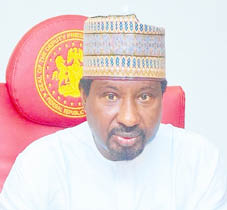The Senate last Tuesday inaugurated its committee to process bills and proposals seeking amendments to the country’s constitution, a sessional parliamentary ritual, which experts said leaves much to be desired because critical amendments with significant impacts on citizens’ wellbeing had failed to scale through.
The panel, chaired by the Deputy Senate President, Barau Jibrin, has one senator from each of the 36 states and the FCT and one from each of the six geo-political zones.
Its membership consists of ranking senators who had actively participated in previous exercises, and all the female members of the Senate.
Benjamin Kalu, the Deputy Speaker of the House of Representatives, is also chairing the review committee in the Green Chamber, which is already considering over 40 bills seeking alterations to the 1999 Constitution on many issues including the rotational presidency, state police, and local government autonomy.
- Constitution Review: Reps Will Accommodate Every Interest -Spokesperson, Agbese
- Of constitution review and restructuring
Unlike the previous exercises that dragged toward the end of the parliamentary sessions, the present committee has set 24 months to complete the work, giving room for any rejected proposal to be reworked and sent back for presidential assent.
“It is important to note that the committee is not constituted to rewrite the 1999 Constitution but to process proposed amendments to it, and we will strive to conclude this assignment within the next 24 months,” Barau had said during the inaugural meeting of his panel.
Though the National Assembly often earmarks N1 billion of its budget for the constitution review exercise, those familiar with the committee’s work said the exercise gulped far more than what is voted for. The panel’s financial dealings are shrouded in secrecy, leaving room for speculation.
Many Nigerians are skeptical about the amendment exercise, saying the outcomes were not commensurate with the billions of naira expended on the exercise.
Successful amendments
Constitution amendment is a lengthy process, starting from bill sponsorship during plenaries and proposals to public hearings, voting, concurrence of state legislatures and presidential assent.
Bills and proposals that are approved by the two chambers of the National Assembly would be sent to the 36 state assemblies for votes.
A simple majority of votes is required in at least two-thirds of state assemblies and the amendments that sail through would be sent to the president for assent.
In the Ninth National Assembly, the federal lawmakers voted on 68 bills aimed at amending the 1999 constitution, of which 44 were approved by both chambers and sent to state assemblies for concurrence.
Only 16 of the constitution alteration bills were signed into law by former President Muhammadu Buhari.
Chief among them is the financial independence of state Houses of Assembly and state judiciary, and the removal of railway, prison, and electricity from the exclusive legislative list to the concurrent list.
The bill mandating the president and governors to appoint ministers and commissioners respectively within 60 days of taking the oath of office also scaled through.
However, critical amendments like state police, independent candidacy, diaspora voting, financial autonomy for local government, and special parliamentary seats for women were rejected.
Deputy House Speaker Kalu explained why some of these bills were not approved.
He said, “In the last constitution review efforts, there were some key constitution amendment proposals that did not pass either because we did not fully understand their provisions or we did not have enough time to agree on them.”
Issues current exercise seeks to address
Though the constitution review committees in both chambers are yet to release the thematic areas the exercise would focus on, the chairmen of the committees, Barau Jibrin and Benjamin Kalu had said the areas of consideration in the amendment would include the establishment of state police, increased participation of women in politics and enhancement of fiscal federalism through local government autonomy.
At the House of Representatives, over 40 constitutional amendment bills are being considered, many of them generated heated debates at plenary.
The bills are those seeking the creation of state police, the conduct of referendum for states seeking self-determination, and granting constitutional roles to traditional rulers.
Others are granting federal and state legislatures power to summon the president and governors to answer questions on issues of national security, empowering governors to appoint or remove judges of state courts.
The deputy speaker, at the inauguration of the House Special Committee on Constitution Review on Monday, assured Nigerians that proposals passed in the last constitution review exercise but which were not assented to by the president, would be revisited.
Lawmakers speak
Senator Barau, at the inaugural sitting of his panel, said the process would be guided by the highest principles of transparency, diligence and collaboration.
“We will be guided by the laws and rules of legislative business, including precedence where it does not conflict with any known rule while also being innovative where we can.
“The committee will strongly consult and engage critical stakeholders in a way that will ensure that bills passed by the National Assembly will be approved by the state Houses of Assembly and assented to by Mr President,” Barau said.
Senator Sani Musa (Niger) urged his colleagues to sort the bills and proposals based on importance.
He said, “We have learned a thing from the last Assembly when most of the bills were not prioritised.
“So, this time, let us prioritise and take the ones that are very critical. like the issue of the state police, devolution of powers, and areas that we feel will have a direct impact on our constitution. When we do this, it will fast-track the constitution review,” he said.
Senator Abdul Ningi (Bauchi) said Nigerians were skeptical about the previous constitution review exercise because important issues to them were not considered.
He said, “Out there, people are going to be skeptical as always about our commitment, our political will, and our level of patriotism to achieve the desired results.
“And that is because more often than not, when we discuss constitutional amendments, we hardly put the nation as a priority. First, we put our political divide, our partisanship and our ethnic and religious divides.’’
Senator Adamu Aliero (Kebbi), admonished members to avoid controversial issues that may not sail through if included in the exercise.
Senator Enyinnaya Abaribe (Abia) also advised the committee to use the template adopted by the Ninth National Assembly by avoiding a lump sum document presentation made in the past and rejecting presidential assent due to one or two controversial issues involved.
Former Senate President, Ahmad Lawan (Yobe) spoke about concluding the exercise timely.
“Time is of the essence. Those of us nominated are not essentially the ones to come up with the ideas, we are supposed to collect and collate the ideas.’’
The Speaker of the House of Representatives, Tajudeen Abbas, also said the parliament will work hand-in-hand with the executive arm of government at the federal and state levels to ensure that the process enjoys the backing of Nigerians.
Speaking at the inauguration of the House Special Committee on Constitution Review on Monday, Abbas said, “The process will be deeply rooted in engaging with the Nigerian people at all levels, including traditional and religious institutions, pressure groups and trade unions, ethno religious organisations, the diaspora community, and much more.
“We intend to harness the inputs of all Nigerians at the level of senatorial districts through open fora, public consultations, and digital platforms, ensuring that every voice is heard and considered.”
Deputy Speaker Kalu said in the discharge of its assignment, the committee would ensure “that every voice is heard, every perspective is considered, and every citizen is empowered to participate in the shaping of our nation’s future.”
“It is important to reiterate that we are willing to accommodate more proposals to enhance our constitution and strengthen our democracy. In addition, we await executive-sponsored bill proposals that reflect issues on the Renewed Hope Agenda of Mr President,” Kalu said.
Focus on critical issues that affect governance – CISLAC
The Executive Director, the Civil Society Legislative Advocacy Centre (CISLAC), Auwal Musa Rafsanjani, urged the National Assembly to take the constitutional amendment exercise seriously and prioritise issues that affect governance.
He said issues of state police, fiscal federalism, including financial autonomy to local government should be prioritised by the National Assembly and the lawmakers should ensure they are passed and assented to.
Rafsanjani said, “The National Assembly should prioritise key contentious issues that affect governance, our unity and enable Nigerians to have a sense of belonging and also provide peace and sustainable development.
“There are a lot of issues that have been discussed at local, state, and national levels or even regional levels, which, if we are serious about amending the constitution, we should have carried these things because they are popular demands, these are democratic demands that Nigerians want.
“It appears to me that, for some reason, both the National Assembly and the government are not serious about treating those issues to bring lasting solutions to this country. So, we hope this time around the constitutional amendment to be carried out will capture those issues.”

 Join Daily Trust WhatsApp Community For Quick Access To News and Happenings Around You.
Join Daily Trust WhatsApp Community For Quick Access To News and Happenings Around You.


